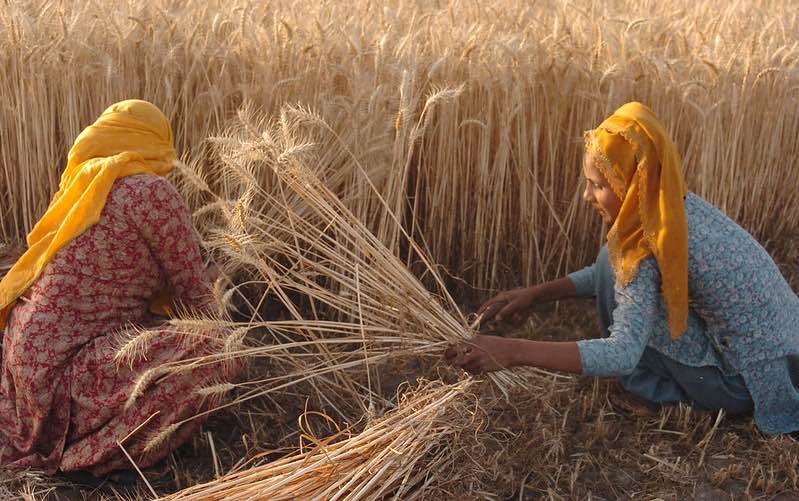Lockdowns and other social distancing measures imposed during the early months of the COVID-19 pandemic in 2020 disrupted agricultural operations around the world, with particular force on smallholders and the poor. While many studies have documented these effects, few have directly quantified the losses. In a recent paper published in Agricultural Economics, we measure the sources and magnitude of crop income reductions during the initial months of India’s lockdown—one of the strictest in the world.
In an earlier paper in World Development, we had found substantial heterogeneity in how the lockdown affected farmers in Odisha vs. Haryana, two Indian states. We found that wheat farmers in Haryana were less affected than lentil farmers in Odisha, likely because there was state procurement for wheat, whereas there was no such mechanism to stabilize prices for lentils, typically sold at the farmgate to traders. However, we only noted whether farmers reported a disruption without quantifying effects on income, and we compared two disparate states with very different agricultural and socioeconomic environments. To put our hypothesis under further scrutiny, in our Agricultural Economics paper, we decided to test for heterogeneity within Haryana by comparing a crop with centralized procurement—wheat—to one without it—tomatoes.
We used survey data collected from 1,767 wheat and tomato farmers spread across four Haryana districts. Wheat farms in the state are usually larger and can benefit from state procurement of the harvested crop, while tomato farms tend to be more vulnerable and more dependent on itinerant traders for purchasing their produce. The surveys were conducted by phone during the lockdown in the context of an ongoing panel survey on agricultural risk management. In addition to asking whether farmers were affected by, say, an increase in transport or a change in output prices, we also asked follow-up questions to explore by how much this had affected their incomes.
It turns out that quantifying losses was crucial. We find that wheat producers were affected to some extent by the lockdown (see Figure 1) but only suffered minimal declines in income (see Figure 2). By contrast, for tomato producers, income fell by 50% relative to their expected income in a normal year.
Figure 1
Figure 2
We find that this is largely due to a steep fall of tomato prices (see Figure 2) as a consequence of widespread supply chain disruptions, a finding that is corroborated by studies that use secondary data. From qualitative work, we learned that many tomato producers shifted from wholesale markets to local retail markets, resulting in a sharp increase in local supply and a fall in prices.
Compared to wheat producers, we also find that tomato farmers’ reduced income was associated with an increase in borrowing and reduced food security.
One year later
Did these disruptions to farming operations due to COVID-related restrictions continue during 2021, when India faced a second, deadlier wave? In a follow-up survey administered in 2021 (not included in the Agricultural Economics paper), we find an improvement in the agricultural environment for both wheat and tomato, probably related to the concerted effort by the Indian authorities to ensure the smooth functioning of essential agricultural activities. Overall, we see substantial reductions in the percentage of wheat and tomato farmers reporting disruptions in 2021 compared to 2020, across both pre- and post-harvest operations. Importantly, only 13% of tomato farmers reported lower prices, as opposed to 47% the previous year.
The gap in disruptions between wheat and tomato observed during the first COVID season, however, seems to have persisted. While India had a low COVID-19 caseload during the 2021 spring wheat harvest, it witnessed a huge spike in cases and strict lockdowns in May and June, when the tomato harvest was getting underway—bad luck for tomato farmers yet again. This resulted in a considerable fraction of tomato farmers still reporting higher spending in labor (21%) and transport (41%) during 2021, compared to pre-COVID times.
What does this mean?
Our research shows how important it is to quantify income losses using short phone surveys; instead of just asking whether someone was affected, we go a step further and ask them to specify the losses from each type of disruption. Absent such inquiries, one could have been led to believe that wheat and tomato producers were similarly affected in 2020, and that for tomato producers, things were as worse in 2021 as in 2020.
This information allows us to get to the real issue: market risk. Amid the 2020 disruptions, tomato farmers suffered greater impacts than wheat producers primarily because of plummeting market prices, and in 2021, the main disruption is related to increased costs of transportation related again to accessing markets. Based on our findings, we would argue for targeting assistance towards producers of crops that face substantial price risk, and in introducing policies that stabilize market access and prices, which are key to efforts to aid recovery and build the resilience of smallholder farmers.
Francisco Ceballos is a Research Fellow with IFPRI's Markets, Trade, and Institutions Division (MTID); Samyuktha Kannan is an MTID Research Analyst based in New Delhi; Berber Kramer is an MTID Senior Research Fellow based in Nairobi.
This work was undertaken as part of the IFPRI-led CGIAR Research Program on Policies, Institutions, and Markets (PIM) and the CGIAR Research Program on Climate Change, Agriculture, and Food Security (CCAFS). Funding support for this study was provided by the CGIAR Platform for Big Data in Agriculture and the International Initiative for Impact Evaluation (3ie).







